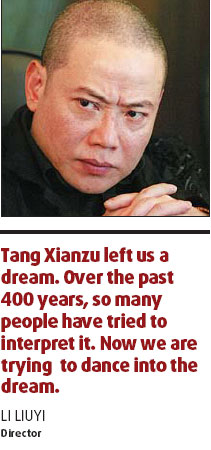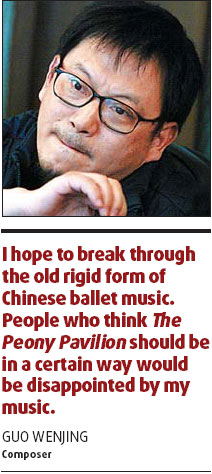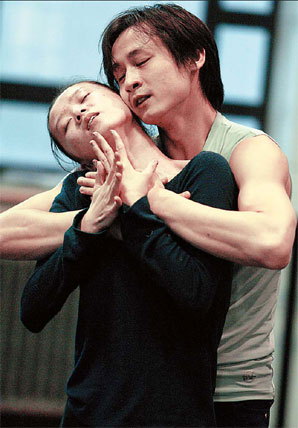Forbidden dreams
Composer Guo Wenjing says the most challenging part he created for the original ballet The Peony Pavilion are the two pas de deux between the leading female role Du Liniang and her lover Liu Mengmei. One is the first scene in Act I in which the lovers embrace in the dream. The other is the last scene of the ballet in which the ghost of Du makes love with the living Liu.
"It's so hard to write the music because I neither make love in dreams nor with ghosts," Guo says half joking half serious.
"But it's interesting and I believe that art first of all must be interesting," he adds.
|
Wang Qimin (left) and Li Jun play the leading roles in the ballet version of The Peony Pavilion. Photos by Jiang Dong |
From May 2 to 7, the National Ballet of China (NBC) will premiere the "interesting" ballet version adapted from the Chinese classic The Peony Pavilion at Tianqiao Theater.
It has taken NBC seven years to complete its take on this classic written by Tang Xianzu of the Ming Dynasty (1368-1644), according to Zhao Ruheng, the president of NBC.
"We all enjoy working on the ballet because our creation is based on a very good story. It is such an extreme tale that it gives us many possibilities. A woman falls in love with a man whom she's only met once in a dream and dies longing for him. Then she tries to come back to life to continue the love," says director Li Liuyi who is a veteran theater director with Beijing People's Art Theater.
"Tang Xianzu left us a dream. Over the past 400 years, so many people have tried to interpret it. Now we are trying to dance into the dream," says the director who himself has been fascinated by the story for years and has read a large number of works about it.
"We are trying to make this dreamy ballet extremely beautiful and true," Li adds.
In his eyes, The Peony Pavilion is so much more than a love story. It's also a scathing indictment of the limitations of the super-rationalist, but rather clueless, world of Neo-Confucian politics.
"The playwright Tang also borrowed freely from Buddhist and Taoist philosophical concepts. After all, Du's love is so strong that it has the power to last three lifetimes - and karmic rebirth was a notion drawn from the Buddhist tradition," Li says.
Zhao says that they decided to adapt the Peony Pavilion because it is such a great Chinese classic and is often compared to Shakespeare.
"Both authors relied on supernatural forces to further their plots. The Flower Goddess, for instance, who brought the dream lovers together in The Peony Pavilion, is almost interchangeable with Puck in A Midsummer Night's Dream or Ariel in The Tempest," Zhao explains.

"What Tang and Shakespeare ultimately shared was their deep understanding of how passion plays out among mortals, especially the young, and how it can trump social mores and defy rigid tradition."
Composer Guo's score blends Kunqu Opera and Western classical music. He himself describes it "post-modern, multifarious and alien".
In addition to his own composition, in the score of the ballet Guo has refashioned Kunqu Opera arrangements for Ravel's Daphnis and Chloe, Debussy's The Afternoon of a Faun, Respighi's Roman Festival, Holst's The Planets and Prokofiev's Scythian Suite.
"I consider The Peony Pavilion an opportunity to do an experiment," says Guo.
"I hope to break through the old rigid form of Chinese ballet music. Chinese have a fixed view of The Peony Pavilion. But I agree with director Li that Tang's drama provides many possibilities. People who think The Peony Pavilion should be in a certain way would be disappointed by my music."
Fei Bo, the production's 28-year-old choreographer, says he is always willing to try something new.
"To tell the truth, I feel very nervous as the premiere is coming. I cannot say the production is perfect but the main point is that I enjoy working with these famous artists," says Fei, whose Memory won him the Best Choreographer prize at the Helsinki International Ballet Competition in 2005.

This is the first full-length ballet that Fei has choreographed on his own. "The process of creating is full of excitement, pain, suffering, confusion and exploration," he says.
"The director, composer, setting and costume designers are all artists with strong personalities and each has his own understanding of the story.
"In my interpretation, all the love, desire, suffering, departure and death happens between the time when Du closes her eyes and awakens."
The unique music and extremely emotional choreography contrasts the simple but impressive setting by the German designer Michael Simon, and the graceful costumes by Emi Wada.
Simon is also a playwright and director who has designed many dramas, ballets and operas. Wada won a costume design Academy Award for the movie Ran and has collaborated with Chinese director Zhang Yimou for his movies Hero and House of Flying Daggers, Chinese director Tian Zhuangzhuang for his movie The Go Master and Chinese composer Tan Dun's Metropolitan Opera The First Emperor.
(China Daily 04/29/2008 page19)















